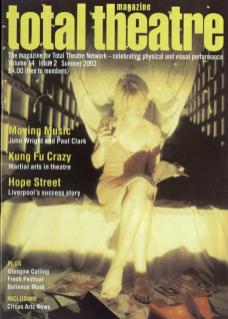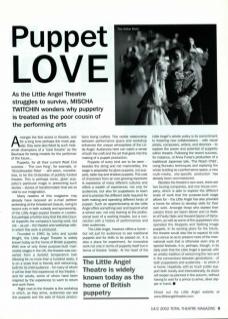Amongst the first actors in theatre, and for a long time perhaps the most popular, they were also feted by such modernist champions of a ‘total theatre' as the Bauhaus for being models for the performer of the future...
Puppets, for all their current West End success – The Lion King, for example, or Shockheaded Peter – still seem, nonetheless, to be the Cinderellas of publicly funded theatre. This is perhaps ironic, given puppetry's particular magic in presenting such stories – stories of transformation that are so vital to our imagination.
Many readers of this magazine may already have received an e-mail petition protesting at the threatened closure, owing to recent cuts in both subsidy and sponsorship, of the Little Angel puppet theatre in London. It is perhaps a further irony that the Arts Council supports the company's touring work, but not – as yet – the theatre and workshop within which this work is produced.
Founded in 1961 by John and Lyndie Wright, the Little Angel Theatre is widely known today as the home of British puppetry. With one of only three purpose-built marionette stages in the UK, the theatre was converted from a derelict temperance hall. Allowing for no more than a hundred seats, it is on a scale that is friendly and welcoming, both for its child audience – for many of whom it will be their first experience of live theatre – and for adults, some of whom have been inspired by the experience to want to return and work there.
Right next to the theatre is the workshop in which, as they arrive, audiences can see the puppets and the sets of future productions being crafted. This visible relationship between performance space and workshop enhances the unique atmosphere of the Little Angel. Audiences here can catch a sense of both the craft and the art that goes into the making of a puppet production.
The Little Angel Theatre is widely known today as the home of British puppetry.
Puppets of every kind are to be seen – besides the string and rod marionettes, the stage is adaptable for glove puppets, rod puppets, table-top and shadow puppets. This cast of characters from an ever-growing repertoire is expressive of many different cultures and offers a wealth of experience; not only for audiences, but also for puppeteers to learn and to practise the different skills required for both making and operating different kinds of puppet. Such an apprenticeship at the Little Angel offers something over and beyond what a school can: not only training at the professional level of a working theatre, but a connection with a history of performances and their audiences.
The Little Angel, however, offers a home – but not just for audiences to see traditional puppets and for skills to be passed on. It is also a place for experiment, for innovative work not only in terms of puppetry itself but in terms of theatre ‘totally'. At the heart of the Little Angel's artistic policy is its commitment to fostering new collaborations with visual artists, composers, writers, and directors – to explore the power and potential of puppetry within theatre. Following the recent success, for instance, of Anna Furse's production of a traditional Japanese tale, The Peach Child, using Bunraku techniques and exploring the whole building as a performance space, a new multimedia, site-specific production has already been commissioned.
Besides the theatre's own work – there are two touring companies, and one house company, which is able to explore the different scale of work that the purpose-built stage allows for – the Little Angel has also provided a home for others to develop skills for their own work. Amongst those who started their careers there are Gavin Glover and Liz Walker of Faulty Optic and Howard Gayton of Ophaboom, as well as some of the puppeteers who operated the Muppets and Spitting Image puppets. In its exciting plans for the future, the theatre would also like to expand its role as a venue so as to present more of the international work that is otherwise seen only at special festivals. It is, perhaps, though, in its daily work that the Little Angel is special; with an artistic tradition of welcoming the new and in the connections between generations – of both puppeteers and audiences – to which it is home. Hopefully, with so much public support both locally and internationally, its doors will reopen as planned in the autumn, without having to wait for a prince to arrive, silver slipper in hand.
Check out the Little Angel website at www.littleangeltheatre.com

